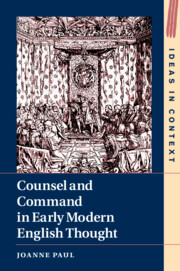Book contents
- Counsel and Command in Early Modern English Thought
- Ideas in Context
- Counsel and Command in Early Modern English Thought
- Copyright page
- Contents
- Acknowledgements
- Introduction
- Part I
- Part II
- Chapter 3 Machiavellian Counsel
- Chapter 4 Political Prudence
- Chapter 5 Late Tudor Counsellors
- Part III
- Bibliography
- Index
- Ideas in Context
Chapter 5 - Late Tudor Counsellors
from Part II
Published online by Cambridge University Press: 18 February 2020
- Counsel and Command in Early Modern English Thought
- Ideas in Context
- Counsel and Command in Early Modern English Thought
- Copyright page
- Contents
- Acknowledgements
- Introduction
- Part I
- Part II
- Chapter 3 Machiavellian Counsel
- Chapter 4 Political Prudence
- Chapter 5 Late Tudor Counsellors
- Part III
- Bibliography
- Index
- Ideas in Context
Summary
By abandoning the focus on virtue and replacing it with a focus on preservation by means of occasional deception, the Machiavellian discourse throws suspicion on the role of the counsellor, and especially problematises his powerful role in relation to the monarch. This is especially the case in late Tudor England, ruled by monarchs perceived to be ‘weakened’ by their age or gender. Whereas the Henrician humanists had advocated counsellors who ruled their princes, the threat of Machiavellianism and weak monarchs renders such arguments threatening, and the counsellor falls under greater suspicion for his perceived usurpation of power. At the same time – and by contrast – there is a view that such weak monarchs require strong counsel to guide them. If this cannot come from individuals, as they are likely to be self-interested, then it must come different, ‘dis-interested’, sources. Whereas single private counsellors will be self-interested and thus ought not to rule a monarch, especially a female one, assemblies such as parliament will guide the prince according to the good of the commonwealth. For this reason, they need to have a share in the government. Command becomes ‘bridled’ by this source of counsel.
- Type
- Chapter
- Information
- Counsel and Command in Early Modern English Thought , pp. 122 - 144Publisher: Cambridge University PressPrint publication year: 2020

